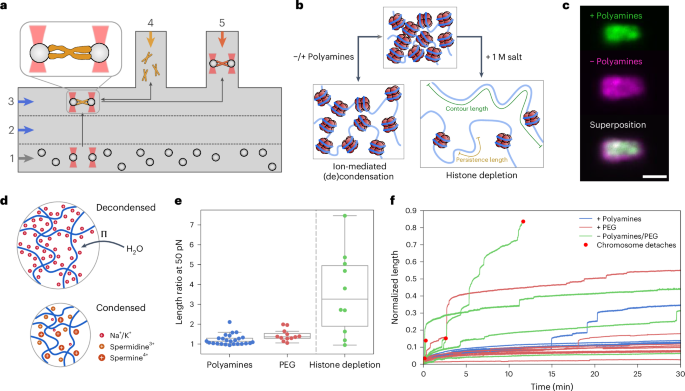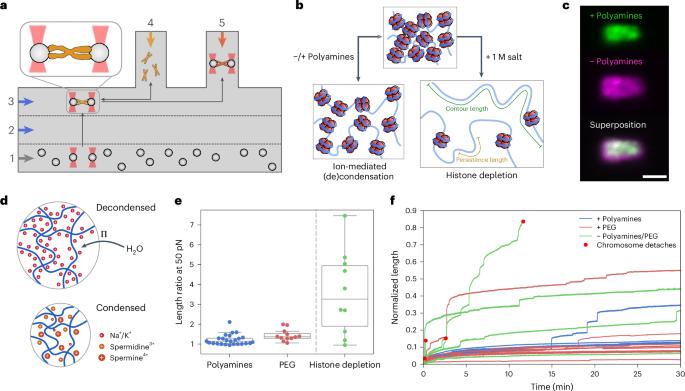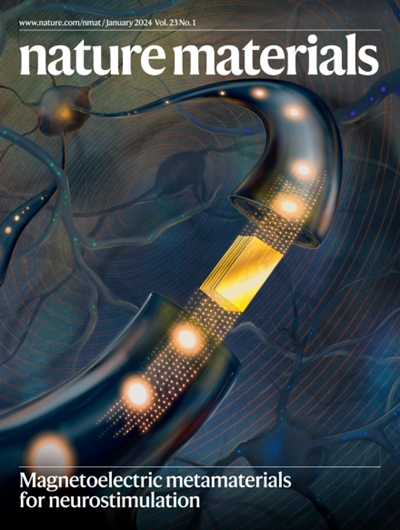离子介导的缩聚控制着有丝分裂染色体的机械结构
IF 37.2
1区 材料科学
Q1 CHEMISTRY, PHYSICAL
引用次数: 0
摘要
在真核细胞的有丝分裂过程中,有丝分裂纺锤体产生的机械力会将姐妹染色单体拉入新生的子细胞中。有丝分裂染色体如何在这些力的作用下获得必要的机械硬度和稳定性以保持其完整性?在这里,我们利用光学镊子证明,参与生理性染色体凝聚的离子对染色体的稳定性、硬度和粘性耗散至关重要。我们将这些实验与高盐组蛋白耗竭和理论相结合,证明染色体的弹性源于染色质纤维作为柔性聚合物的行为,而能量耗散可通过将染色质环路模拟为纠缠聚合物溶液来解释。总之,我们展示了有丝分裂染色体这种复杂程度令人难以置信的生物材料的集体特性是如何从分子特性中产生的,以及它们是如何受物理化学环境控制的。本文章由计算机程序翻译,如有差异,请以英文原文为准。


Ion-mediated condensation controls the mechanics of mitotic chromosomes
During mitosis in eukaryotic cells, mechanical forces generated by the mitotic spindle pull the sister chromatids into the nascent daughter cells. How do mitotic chromosomes achieve the necessary mechanical stiffness and stability to maintain their integrity under these forces? Here we use optical tweezers to show that ions involved in physiological chromosome condensation are crucial for chromosomal stability, stiffness and viscous dissipation. We combine these experiments with high-salt histone depletion and theory to show that chromosomal elasticity originates from the chromatin fibre behaving as a flexible polymer, whereas energy dissipation can be explained by modelling chromatin loops as an entangled polymer solution. Taken together, we show how collective properties of mitotic chromosomes, a biomaterial of incredible complexity, emerge from molecular properties, and how they are controlled by the physico-chemical environment. The physical mechanisms that govern chromosomal viscoelasticity remain elusive. Here the authors combine single-chromosome manipulation and computational methods to show that their collective properties are controlled by the physico-chemical environment.
求助全文
通过发布文献求助,成功后即可免费获取论文全文。
去求助
来源期刊

Nature Materials
工程技术-材料科学:综合
CiteScore
62.20
自引率
0.70%
发文量
221
审稿时长
3.2 months
期刊介绍:
Nature Materials is a monthly multi-disciplinary journal aimed at bringing together cutting-edge research across the entire spectrum of materials science and engineering. It covers all applied and fundamental aspects of the synthesis/processing, structure/composition, properties, and performance of materials. The journal recognizes that materials research has an increasing impact on classical disciplines such as physics, chemistry, and biology.
Additionally, Nature Materials provides a forum for the development of a common identity among materials scientists and encourages interdisciplinary collaboration. It takes an integrated and balanced approach to all areas of materials research, fostering the exchange of ideas between scientists involved in different disciplines.
Nature Materials is an invaluable resource for scientists in academia and industry who are active in discovering and developing materials and materials-related concepts. It offers engaging and informative papers of exceptional significance and quality, with the aim of influencing the development of society in the future.
 求助内容:
求助内容: 应助结果提醒方式:
应助结果提醒方式:


